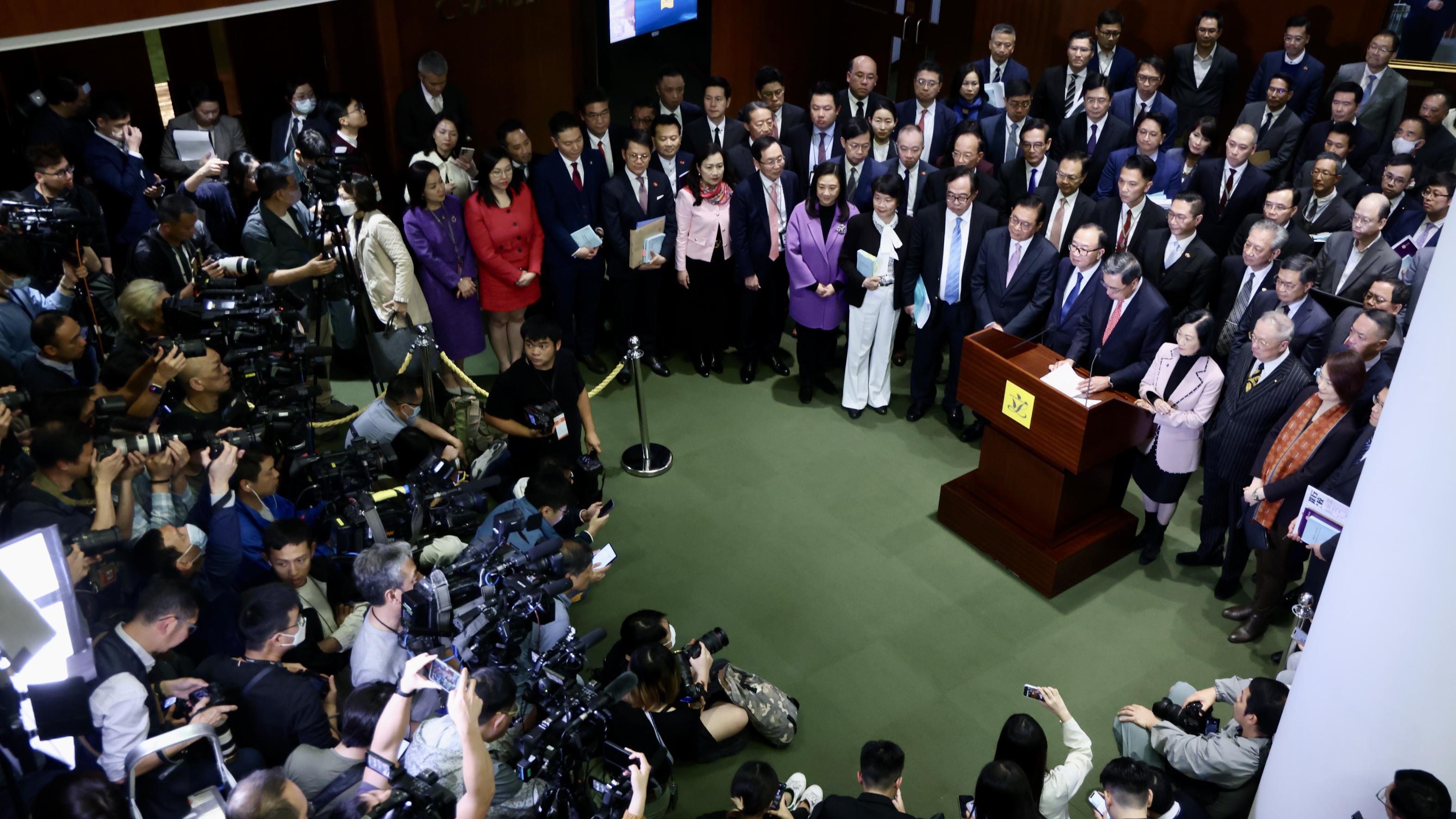Supporters at home and abroad dismiss criticism of national security legislation
 LegCo President Andrew Leung Kwan-yuen (center) speaks to the media after the third reading of the proposed Safeguarding National Security Ordinance at the Legislative Council in Hong Kong on Mar 19, 2024. (EDMOND TANG / CHINA DAILY)
LegCo President Andrew Leung Kwan-yuen (center) speaks to the media after the third reading of the proposed Safeguarding National Security Ordinance at the Legislative Council in Hong Kong on Mar 19, 2024. (EDMOND TANG / CHINA DAILY)
More Hong Kong people at home and abroad voiced their strong objection to the smears by some Western politicians on the city's national security ordinance, which will take effect on Saturday.
Hong Kong's legislature approved the long-awaited Safeguarding National Security Ordinance on Tuesday. The ordinance, legislated under Article 23 of the Basic Law, was created to prevent and punish five types of acts endangering national security in Hong Kong, including treason, insurrection and espionage.
Following its passage in the Legislative Council, some Western politicians and organizations have groundlessly criticized the law, saying that it may restrict Hong Kong's freedom and human rights and undermine the city's long-standing advantages. Among the detractors are United Kingdom Foreign Secretary David Cameron, former British governor of Hong Kong Chris Patten, Vedant Patel, a spokesman for the United States Department of State, and Japan's Ministry of Foreign Affairs.
READ MORE: Commissioner's office condemns slander against security law
Representatives from the Hong Kong Special Administrative Region attended the 55th regular session of the United Nations Human Rights Council in Switzerland on Wednesday, rebutting the defamation and smearing of the ordinance.
Horace Cheung Kwok-kwan, the SAR's deputy secretary for justice, told the UN council that the ordinance will better protect the country and the city from genuine threats to national security amid increasingly intricate geopolitics.
Stressing that the ordinance will strictly adhere to the principles of international law and practices, Cheung said there are appropriate exceptions and defenses, and he reiterated that people's rights and freedoms will be fully protected in accordance with the law.
Edmond Sy Hon-ming, vice-chairman of the Hong Kong CPPCC Youth Association and a legal professional, delivered a speech by video to the UN meeting.
Sy said Hong Kong people still vividly remember the unprecedented social unrest in 2019, emphasizing that a robust legal framework is necessary to safeguard national security and protect people's lives and property as well as their human rights and freedom of speech.
Hong Kong experienced more than 150 years of colonial rule, and the residents do not want the city to be plagued by an unstable social environment again, Sy said. He added that numerous places around the world have regulations to safeguard national security, because every country has the responsibility to protect the safety and property of its residents.
Also addressing the council by video, Jonathan Chow Yuen-kuk, a newly elected district councilor in Hong Kong, said that since the National Security Law for Hong Kong was implemented in 2020, the city has been gradually moving toward stability. Chow said his experiences have taught him that national security is the foundation of social stability, adding that his work in the community can now focus on further improving residents' quality of life. He also invited everyone to visit Hong Kong to witness its vibrancy and safety.
At home, representatives from various sectors expressed their objection to and condemnation of Western countries' smear campaign.
ALSO READ: Chinese embassy slams US slandering of security law
On Thursday afternoon, the city's biggest political party — the Democratic Alliance for the Betterment and Progress of Hong Kong — protested with banners and placards outside the British consulate general in Hong Kong, strongly condemning UK Foreign Secretary Cameron's remarks.
The DAB said the smooth passage of the ordinance fully demonstrates the Hong Kong people's support for the legislation and their consensus on the significance of national security.
In a rally outside the consulate general of the United States in Hong Kong, members of the Hong Kong Federation of Trade Unions, the SAR's largest labor union, expressed strong dissatisfaction with Patel's accusation that the legislation will hinder Hong Kong's openness to the international community. The FTU believes that the ordinance will create a good business environment for Hong Kong and attract investment in the city, including that of foreign-funded enterprises.
The Hong Kong Eastern District Community Association protested outside the consulate general of Japan in Hong Kong in response to a statement about the ordinance by Japan's Foreign Ministry, which the association said distorted the truth and called black white.


